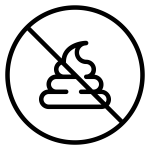Most community members wake up at 5am to milk their cows. They then sell the milk and move on to their farms by 7am. Farming is the major economic activity here, most farmers specialize in maize. The women spend time at home doing chores while men take the animals out to graze, after digging on their farms.
The women then go back to the farm to cultivate in the evening when it's cool. The men come back from grazing late and then go to the trading center to socialize and pass time with friends. Everyone retires by 10pm for an early morning again.
These community members are united in all things, whether it be partying or mourning together during funeral events.
Water
The main source of water in this area is an unprotected spring. The water pools deep enough for community members to dunk their containers under the surface. They also suspended logs across the spring to draw water from its deep middle.
This water is entirely open to contamination which comes in many forms. The people who fetch water dirty it with their containers, while animals are free to come and go to use the same source for drinking, bathing and defecating. Surface runoff when it rains washes more contaminants into the water.
There are a constant number of typhoid cases in this community, since this dirty water meets their drinking needs. They also use this water for cooking, cleaning, irrigating crops and watering animals.
"The health of the children is deteriorating because of drinking dirty, contaminated water. This is because not every family boils the drinking water that they use!" Mr. Fred Barungi said.
Sanitation
Less than half of households have a pit latrine. Materials vary depending on the economic status of the family - they can be made of bricks or made of sticks and mud. The latrines we observed are in poor condition; many are about to collapse and pose great danger to their users. Because of this low coverage and the poor conditions of latrines, open defecation is a huge issue in this community. Instead of using a latrine, people prefer to relive themselves in the privacy of bushes.
Here's what we're going to do about it:
Training
The training’s main objectives are the use of latrines and observing proper hygiene practices, since these goals are inherently connected to the provision of clean water. Open defecation, water storage in unclean containers and the absence of hand-washing are all possible contaminants of a household water supply. Each participating village must achieve Open Defecation Free status (defined by one latrine per household), prior to the pump installation for a shallow hand-dug well.
This social program includes the assignment of one Community Development Officer (CDO) to each village. The CDO encourages each household to build an ideal homestead that includes: a latrine, hand-washing facility, a separate structure for animals, rubbish pit and drying rack for dishes.
We also implement the Community Led Total Sanitation (CLTS) approach with each of our village partners. This aims to improve the sanitation and hygiene practices and behaviors of a village. During these sessions, village leaders naturally emerge and push the community to realize that current practices of individual households – particularly the practice of open defecation– are not only unhealthy, but affect the entire village. CLTS facilitates a process in which community members realize the negative consequences of their current water, sanitation and hygiene behaviors and are inspired to take action. Group interactions are frequent motivators for individual households to: build latrines, use the latrines and demand that other households do the same.
Hand-Dug Well
The community will participate in excavating and constructing the water source. In the meantime, the aim is that all households own an improved latrine. Many households do not use a latrine but use the bush. Due to open defecation, feces are spread all over the village. This leads to waterborne diseases and contamination of groundwater and surface water. Our aim is that the community is able to live a healthy life free of preventable diseases. We endeavor that at the end of our presence in the community, people will have both access to sustainable, clean water and access to sanitation. We have now organized families to form digging groups for latrine construction, and empowered them with tools to use.
Actual well construction will take four to six weeks if there are no challenges. The well will be lined with bricks and sealing clay, and finished with a Consallen pump.
This project is a part of our shared program with The Water Trust. Our team is pleased to provide the reports for this project (formatted and edited for readability) thanks to the hard work of our friends in Uganda.

 Protected Dug Well
Protected Dug Well
 Rehabilitation Project
Rehabilitation Project




























